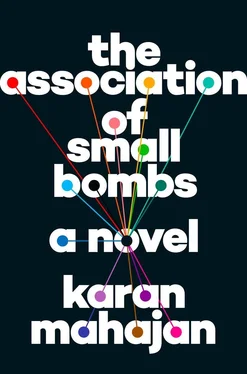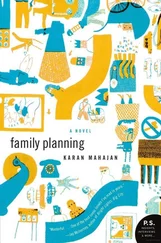Karan Mahajan
The Association of Small Bombs
The bombing, for which Mr. and Mrs. Khurana were not present, was a flat, percussive event that began under the bonnet of a parked white Maruti 800, though of course that detail, that detail about the car, could only be confirmed later. A good bombing begins everywhere at once.
A crowded market also begins everywhere at once, and Lajpat Nagar exemplified this type of tumult. A formless swamp of shacks, it bubbled here and there with faces and rolling carts and sloping beggars. It probably held four seasons at once in its gigantic span, all of them hot. When you got from one end of the market to the other, the wooden carts with their shiny aluminum wheels had so rearranged themselves that the market you were in was technically no longer the market you had entered: a Heisenbergian nightmare of motion and ambiguity. So the truth of the matter is that no one really saw the parked car till it came apart in a dizzying flock of shards.
Strange sights were reported. A blue fiberglass rooftop came uncorked from a shop and clattered down on a bus a few meters away; the bus braked, the rooftop slid forward, leaked a gorgeous stream of sand, and fell to the ground; the bus proceeded to crack it under its tires and keep going, its passengers dazed, even amused. (In a great city, what happens in one part never perplexes the other parts.) Back in the market, people collapsed, then got up, their hands pressed to their wounds, as if they had smashed eggs against their bodies in hypnotic agreement and were unsure about what to do with the runny, bloody yolk. Most startling of all, for the survivors and rescue workers both, was the realization that the main dusty square was rooted so firmly by half a dozen massive trees, trees that had gone all but unnoticed in all those years, their shadows dingy with commerce, their branches cranked low with hanging wares, their droppings of mulberry collected and sold — until the bomb had loosened the green gums of the trees and sent down a shower of leaves, which Mr. Khurana kicked up on the ground as he tried to uncover the bodies of his two sons.
But the leaves, turned crisp, shards themselves, offered nothing. His sons were dead at a nearby hospital and he had come too late.
The two boys were the sum total of the Khuranas’ children, eleven and thirteen, eager to be sent out on errands; and on this particular day they had gone with a friend in an auto-rickshaw to pick up the Khuranas’ old Onida color TV, consigned to the electrician for perhaps the tenth time. But when Mr. Khurana was asked by friends what the children were doing there (the boy with them having escaped with a fracture), he said, “They’d gone to pick up my watch from the watch man.” His wife didn’t stop him, and in fact colluded in the lie. “All the watches were stopped,” she said. “The way they know the time the bomb went off is by taking the average of all the stopped watches in the watch man’s hut.”
Why lie, why now? Well, because to admit to their high-flying friends that their children had not only died among the poor, but had been sent out on an errand that smacked of poverty — repairing an old TV that should have, by now, been replaced by one of those self-financing foreign brands — would have, in those tragic weeks that followed the bombing, undone the tightly laced nerves that held them together. But of course they were poor, at least compared to their friends, and no amount of suave English, the sort that issued uncontrollably from their mouths, could change that; no amount of sobbing in Victorian sentences or chest beating before the Oxonian anchors on The News Tonight , who interviewed them, who stoked their outrage, could drape them or their dead children in the glow of foregone success: Mr. and Mrs. Khurana were forty and forty, and they had suffered the defining tragedy of their lives, and so all other competing tragedies were relegated to mere facts of existence. For a month afterwards, they made do without the TV, which for all they knew was still sitting in the basement workshop of the electrician, its hidden berths of microchips heavy with dust, its screen screwed off and put facedown on the floor, looking into nothing. They only caught their own mugs on The News Tonight because a neighbor knocked on their door and welcomed them into his house to watch the news. He was friendly with them ever after.
________
Now Mr. Khurana, who had been a troubled, twitchy sleeper ever since he’d become a documentary filmmaker years ago, began to suffer from dreams that impressed him deeply, and he never failed to discuss them with his wife or his collaborators. He didn’t mention that he was terrified during their nightly unspooling; that he slept in the crook of his wife’s armpit like a baby, his body greased with sweat, his leg rotating out like the blade of a misfired fan. But the dreams were truly notable, and in the first and most frequent one, he became, for a few minutes, the bomb . The best way to describe what he felt would be to say that first he was blind, then he could see everything. This is what it felt like to be a bomb. You were coiled up, majestic with blackness, unaware that the universe outside you existed, and then a wire snapped and ripped open your eyelids all the way around and you had a vision of the world that was 360 degrees, and everything in your purview was doomed by seeing.
In the dream, the market — where he had been many times, his collar usually popped — was so vivid in his mind, so three-dimensional, that he sometimes lingered on details for hours of dream time. A single foot thrust into the dark cube of a shop would become gangrenous and huge with meaning; it would kick right against the inner wall of his temple, and he would wake up just before he could see the children flying through the shop front outside which they’d been found facedown, a sash of blood showing through the blackened cotton on their backs.
In the mornings he’d rouse Mrs. Khurana and they’d make eerily passionate love, using more muscle than necessary, their insides lurid with lactic acid, and then both would stack their slack bodies against each other and cry, so that later in the evening, when Mrs. Khurana returned from her errands and began to unwrap the sheet from its bulge of bed, she’d notice two parallel lines of salt that marked where they had lain in the morning, shoulders soggy with tears.
But both of them were grateful for each other, for how little they reminisced, how they refused to apply the butterfly effect backwards to their lives or ruin themselves with what-ifs; that neither blamed the other for the fact that the children had taken an auto-rickshaw, hotboxed with May pollution, to Lajpat Nagar that evening. Why bother, when the entire circuitry of their brains had been rewired to send up flares of grief? Why bother with talk? You lift a spoon from a claw of thick stew and you weep. You wrap your hand around an armrest on a bus (sometimes Deepa Khurana would ride to school with the children for the PTA) and it is as if the burning steel was riven from the earth only to remind you of the hotness at the core, to which your children will be returned. Under the shower there is the outline of your body for water to fall around, then a sputter and dry-throated silence in which you are sheathed in the same soap that you remember scrubbing off the shoulders of your boys. No action is safe from meaning. The boys had stored, between them, all the world’s possibilities: Nakul had been handsome and sporty; Tushar had been plump and responsible — what does it matter? Who’s to say that this is what they would have remained? Who’s to say, Mr. and Mrs. Khurana, that you lost something you knew?
Читать дальше












